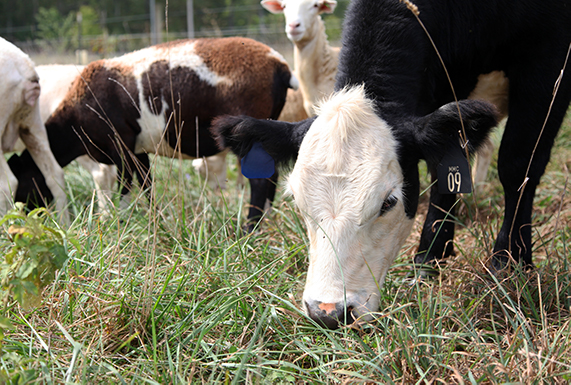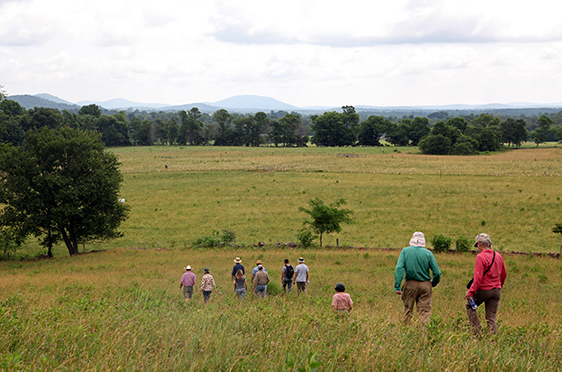Pasture-based Farming in Virginia’s Piedmont
 Mike Sands, like many Mid-Atlantic farmers, raises beef cows and lamb for meat on 110 acres of pasture utilizing
Mike Sands, like many Mid-Atlantic farmers, raises beef cows and lamb for meat on 110 acres of pasture utilizing
two techniques that improve the health of the land and livestock. (Marco Sánchez / Piedmont Environmental Council)
by Jessica Palmer, Farm and Food Program Coordinator, The Piedmont Environmental Council
Bean Hollow Grassfed is located an hour and a half west of Washington D.C. in Virginia’s Rappahannock County. This area of Virginia’s northern Piedmont region has long been a pasture-based farming area dominated by beef cattle production. The rolling hills along the Blue Ridge mountains are prime areas for raising grass-fed animals.
Like many farms in the region, Bean Hollow Grassfed is a pasture-based operation. Farmer and owner, Mike Sands, raises beef cows and lamb for meat on 110 acres of pasture. Mike utilizes two techniques shown to improve the health of the land and livestock – rotational and multi-species grazing.
“The benefits of grazing the sheep and cattle together,” explains Sands, “number one: they eat different things so you get a better utilization of the forage. And for soil health benefit: We try to group the animals tighter together in smaller areas. So what we’re doing is giving longer rest periods but more intense grazing pressure on the soil.”
 Mike Sands leads a pasture walk at Bean Hollow Grassfed (Marco Sánchez / Piedmont Environmental Council)
Mike Sands leads a pasture walk at Bean Hollow Grassfed (Marco Sánchez / Piedmont Environmental Council)
That cycle of short grazing period followed by a long rest period – or rotational mob grazing – fosters more native plant diversity, increase productivity, organic matter, build soil health and food webs, and increase drought resilience.
As the plant community diversifies and the soil health strengthens, the productivity of grazing animals also tends to increase. The result? A more profitable farm enterprise that provides healthy, flavorful grass-fed meat to the community.
The Piedmont Environmental Council works on the ground with farmers such as Sands to support implementation of healthy grazing practices.
Health Care Without Harm has begun to identify and promote grass-fed operations across the country to institutional buyers. Support for these agricultural practices will maintain working farmland, improve air quality, and increase access to healthier protein options.
